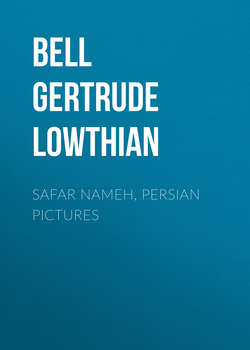Читать книгу Safar Nameh, Persian Pictures - Bell Gertrude Lowthian - Страница 6
THE SHADOW OF DEATH
ОглавлениеSlowly, slowly through the early summer the cholera crept nearer. Out of the far East came rumours of death … the cholera was raging In Samarkand … it had crossed the Persian frontier … it is in Meshed! said the telegrams. A perfunctory quarantine was established between Tehran and the infected district, and the streams of pilgrims that flock ceaselessly to Meshed were forbidden to enter the holy city. Then came the daily bulletins of death, the number of the victims increasing with terrible rapidity. Meshed was almost deserted, for all whom the plague had spared had fled to the mountains, and when a week or two later its violence began to abate, flashed the ominous news: ‘It is spreading among the villages to the westward.’ From day to day it drew ever closer, leaping the quarantine bulwark, hurrying over a strip of desert, showing its sudden face in a distant village, sweeping northwards, and causing sanguine men to shake their heads and murmur: ‘Tehran will be spared; it never comes to Tehran’ – in a moment seizing upon the road to the Caspian, and ringing the city round like a cunning strategist. Then men held their breath and waited, and almost wished that the suspense were over and the ineluctable day were come. Yet with the cholera knocking at their doors they made no preparations for defence, they organized no hospitals, they planned no system of relief; cartloads of over-ripe fruit were still permitted to be brought daily into the town, and the air was still poisoned by the refuse which was left to rot in the streets. It was the month of Muharram; every evening the people fell into mad transports of religious excitement, crowding together in the Shah’s theatre to witness the holy plays and to mourn with tears the death of Hussein. Perhaps a deeper fervour was thrown into the long prayers and a greater intensity into the wailing lamentations, for at the door the grim shadow was standing, and which of the mourners could answer for it that not on his own shoulder the clutching hand would fall as he passed out into the night? The cloud of dust that hung for ever over the desert and the city assumed a more baleful aspect; it hung now like an omen of the deeper cloud which was settling down upon Tehran. And still above it the sun shone pitilessly, and under the whole blue heaven there was no refuge from the hand of God. So the days passed, and the people drank bad water and gorged themselves on rotten fruit, and on a sudden the blow fell – the cholera was in Tehran.
Woe to them that were with child in those days and to them that were sick! One blind impulse seized alike upon rich and poor – flight! flight! All who possessed a field or two in the outlying villages, and all who could shelter themselves under a thin canvas roof in the desert, gathered together their scanty possessions, and, with the bare necessaries of life in their hands, crowded out of the northern gateways. The roads leading to the mountains were blocked by a stream of fugitives, like an endless procession of Holy Families flying before a wrath more terrible than that of Herod: the women mounted on donkeys and holding their babes in front of them wrapped in the folds of their cloaks, the men hurrying on foot by their side. For the vengeance of the Lord is swift; in the East he is still the great and terrible God of the Old Testament; his hand falls upon the just and upon the unjust, and punishes folly as severely as it punishes crime. In vain the desert was dotted over with the little white tents of the fugitives, in vain they sought refuge in the cool mountain villages. Wherever they went they bore the plague in the midst of them; they dropped dead by the roadside, they died in the sand of the wilderness, they spread the fatal infection among the country people.
